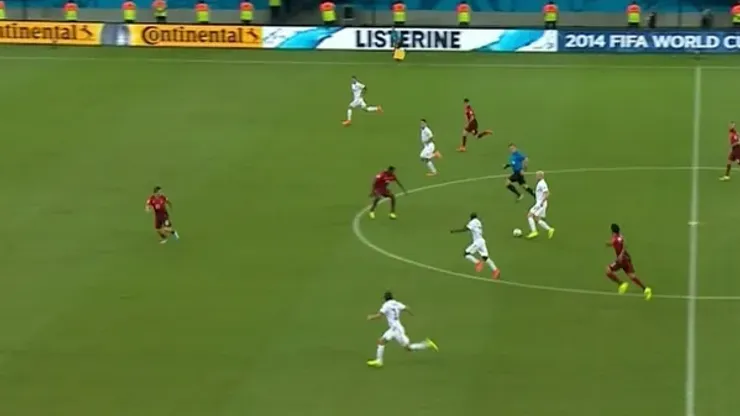Last month, if you would have come to me and said that during the World Cup Jermaine Jones was the US MVP after two matches while Michael Bradley was the goat of both games, AND the U.S. stood a good chance of advancing from the group, I would have had you committed. But this is the reality that U.S. fans face, that the key man in our midfield has been mediocre at best and actually, depending on the Germany result, may have cost the U.S. a chance to advance.
Quite possibly the Portugal game may be the defining moment of Michael Bradley in the 2014 World Cup. With the United States simply needing to retain possession or pin Portugal down in their half to finish off the match, Bradley was disposed in the midfield by Eder who quickly began the break that broke America’s heart. This was in addition to a clear opportunity early in the second half to score a goal for the United States but, with the keeper out of position, he could only kick it straight into the defender standing in front of the net.
In the Ghana match, we could dismiss it as Bradley playing out of position. In Toronto and for the U.S., he had recently played more as an advanced midfielder than a deep-lying playmaker. Against Ghana, however, he played deeper to help Kyle Beckerman shield the backline while Jermaine Jones played wide. So it could be written off as one bad performance in an adjusted position. The Portugal game was more worrying. The turnovers and the inability to consistently link-up with teammates almost cost the U.S. the game and as we said certainly cost them the win.
What’s wrong with Bradley, or more accurately, are our expectations too high for him? I went back and researched his numbers/press beginning in the 2010 World Cup, the first time casual U.S. fans (and admittedly, myself) began to see how good he was. Looking at this New York Times blog post shows that statistically Bradley was impressive in the last World Cup, even if their analysis was slightly overblown. His ground covered stat was impressive, near the top of the tournament, and he didn’t lose possession in the U.S.’s group matches. Looking back on it four years later, Bradley was good, especially since he was only 22.
His form continued for World Cup qualifying and he was at times the best U.S. player on the pitch in these matches. Lest we forget the other U.S. stars were wildly inconsistent: Dempsey was struggling with his club and country form, the backline was constantly being shuffled, Altidore had a goal drought, and then you-know-who was absent for parts of the qualifiers. Bradley was very good by comparison, but even with the inconsistency around him he was very good.
What about his club form? He’s seen mixed success in Europe, playing well in Germany but struggling since his move from Chievo to AS Roma. For Roma, he was caught in a midfield battle and, unable to establish himself for playing time, left for MLS. Roma turned out to be an excellent team this season – the one that could challenge Juventus for the title – but Bradley’s apparent inability to establish himself in the rotation was disappointing. His form since returning to MLS has done little to change this disappointment. He’s been good, even very good at times, but he has not been dominant. After starting the MLS season strong, Toronto has slid back some during the summer although they do have games in hand.
So if he has big game experience and a track record of excelling on the big stage, can we dismiss these first two games as simply an anomaly? My concern that it is not, and here is why. His time at Roma sticks in my head as worrying, as it is the one place where he has faced the most competition in his career. Playing with world class players, he simply couldn’t make it. Now that does not mean he never can, but instead of moving to another Serie A or European top-flight club he came back to MLS. This did not allow him to continue to take the next step in his career that playing with world class players permits you. He can coast in MLS, he cannot coast in Serie A or the World Cup when he is expected to be dominant. The U.S. in this tournament needs him to be dominant.
Michael Bradley still has time and hopefully more than one game to disprove his doubters in this World Cup. But if he plays poorly against Germany, that image of him being stripped of the ball by Portugal may define him in the mind of many Americans and rightfully lower his career projections.
200+ Channels With Sports & News
- Starting price: $33/mo. for fubo Latino Package
- Watch Premier League, Women’s World Cup, Euro 2024 & Gold Cup
The New Home of MLS
- Price: $14.99/mo. for MLS Season Pass
- Watch every MLS game including playoffs & Leagues Cup
Many Sports & ESPN Originals
- Price: $10.99/mo. (or get ESPN+, Hulu & Disney+ for $14.99/mo.)
- Features Bundesliga, LaLiga, Championship, & FA Cup
2,000+ soccer games per year
- Price: $5.99/mo
- Features Champions League, Serie A, Europa League & Brasileirāo
175 Premier League Games & PL TV
- Starting price: $5.99/mo. for Peacock Premium
- Watch 175 exclusive EPL games per season






